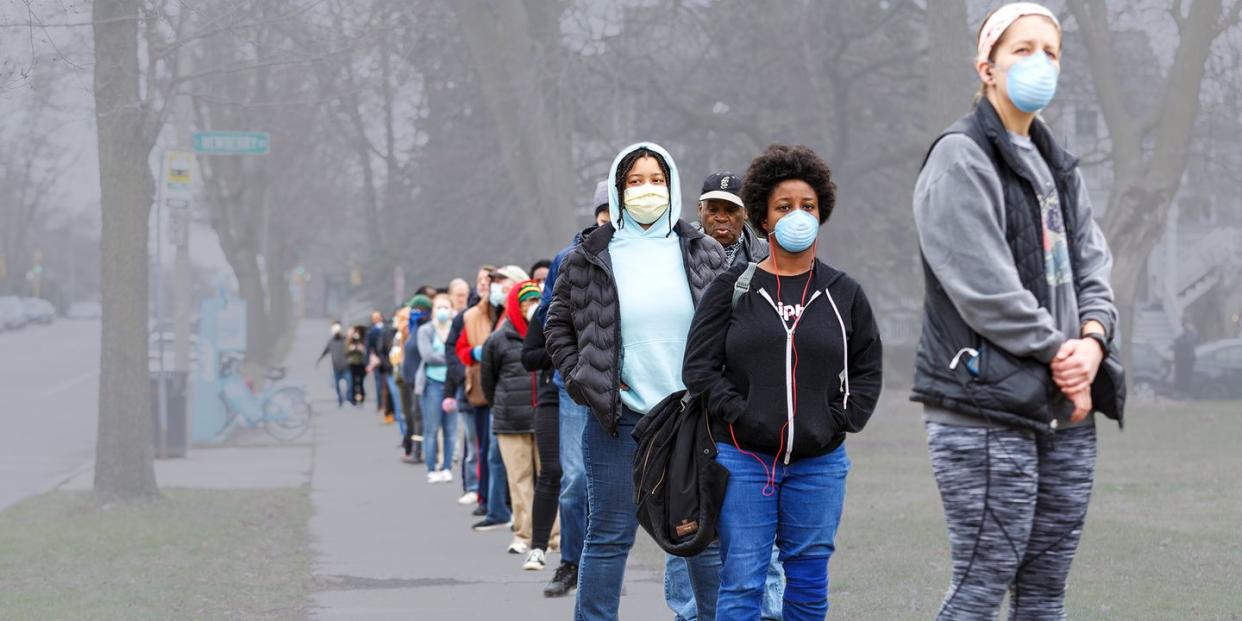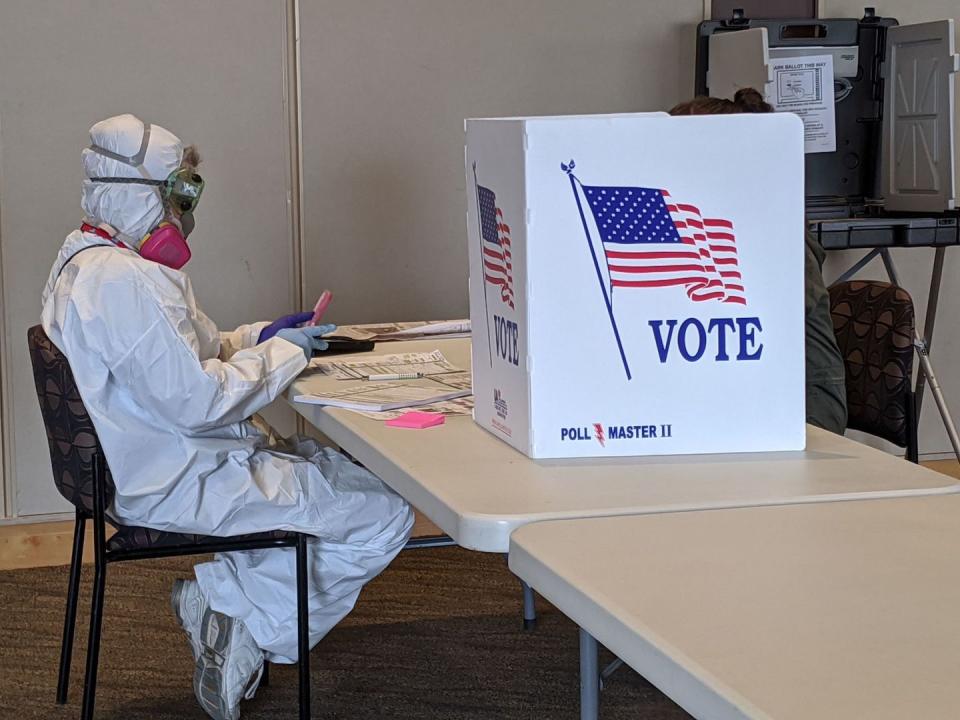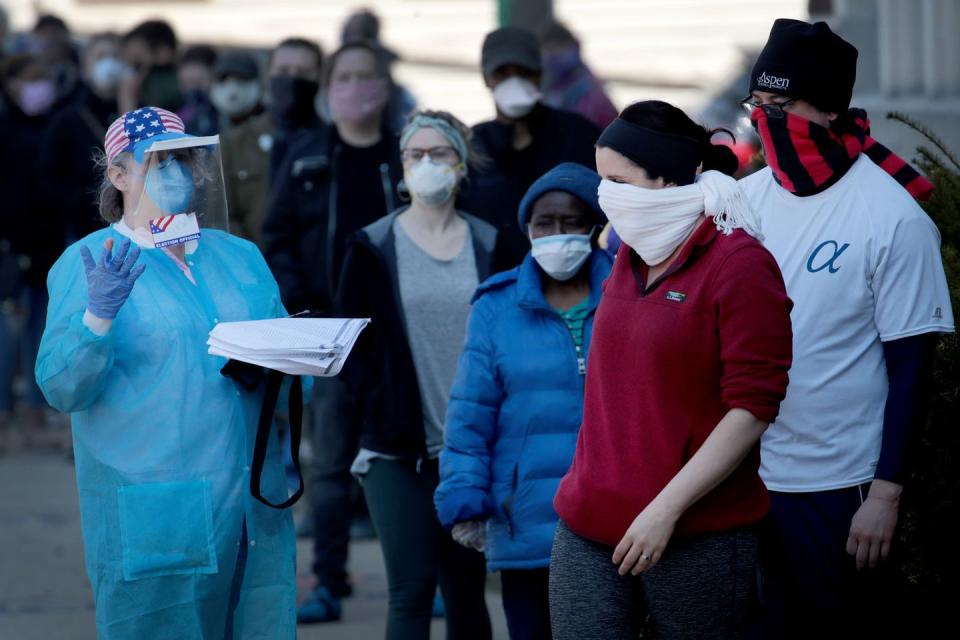It's Not Right, But You Might Have to Vote in Person

If you want to be sure your vote is counted, you're probably going to have to vote in person. This is not right or fair during a pandemic that the ruling regime has allowed to rage out of control across much of the nation, yielding the worst record on COVID-19 response among rich countries. It's not right that this will be necessary because that same regime is waging a systematic campaign to undermine the legitimacy of the election. It's not fair that American citizens will have to risk their health and their lives to exercise their most fundamental democratic right when we could so easily have designed a system where people can vote safely and securely by mail, as states like Oregon have done for decades. But life in a budding authoritarian state is not fair.
The president has latched onto the Republican Party's years-long assault on voting rights and dramatically expanded it. Ever since it became clear that more Americans would vote by mail than usual, the president has relentlessly attacked the prospect. He first did so in rhetoric, baselessly claiming that there would be widespread fraud if people vote by mail in large numbers—again, some states have done so for years without incident—while Republicans simultaneously encourage people to vote by absentee ballot, as he and many of his advisers have in recent elections. There is no functional difference between vote-by-mail and absentee. At one point, he floated—"joked"—about delaying the election on the evidence-free basis that there would be fraud.
Then the focus shifted to using the power of the federal government to destroy vote-by-mail. He tapped a campaign donor, Louis DeJoy—who may have been quite active indeed on the Republican fundraising front—to vandalize the United States Postal Service. The agency's normal functions became collateral damage as deliveries and processing slowed down, but Trump said outright it was related to the election. The implication was clear: if you vote by mail, your ballot might arrive late. If it arrives late, it might not be counted. Even the prospect of this might discourage people from participating. And when proponents of vote-by-mail shifted focus to a perfectly viable alternative—allowing people to drop off their mail ballots in secure boxes—the Trump campaign sued to prevent their use in the key swing state of Pennsylvania. Again, the justification was a baseless claim about fraud.

But this war on democracy has reportedly entered an even darker phase. In a story in The Atlantic Wednesday, Barton Gellman traced what amounts to a sprawling Republican plan to undermine the 2020 contest as a free and fair election. This includes a plot contingent on what election lawyers are calling a "blue shift," where Trump may lead in votes counted on Election Day in some key swing states, but the vast majority of mail-in and provisional ballots counted thereafter—it often takes longer to get them tabulated—are for Joe Biden. This shift impacted elections in 2018 and 2020, and Trump took notice, particularly in Florida. His campaign's strategy will essentially be to ensure as many votes as possible are not counted, particularly those processed after Election Day.
Both parties are bracing for a torrent of emergency motions in state and federal courts. They have already been skirmishing from courthouse to courthouse all year in more than 40 states, and Election Day will begin a culminating phase of legal combat.
Mail-in ballots will have plenty of flaws for the Trump lawyers to seize upon. Voting by mail is more complicated than voting in person, and technical errors are commonplace at each step. If voters supply a new address, or if they write a different version of their name (for example, by shortening Benjamin to Ben), or if their signature has changed over the years, or if they print their name on the signature line, or if they fail to seal the ballot inside an inner security envelope, their votes may not count. With in-person voting, a poll worker in the precinct can resolve small errors like these, for instance by directing a voter to the correct signature line, but people voting by mail may have no opportunity to address them.
During the primaries this spring, Republican lawyers did dry runs for the November vote at county election offices around the country...There were missing signatures and partial signatures and signatures placed in the wrong spot. There were names on the inner security envelopes, which are supposed to be unmarked, and ballots without security envelopes at all. Some envelopes arrived “without a postmark or with an illegible postmark,” [Republican observer J. Matthew] Wolfe wrote. (Watch for postmarks to become the hanging chads of 2020.) Some voters wrote their birthdate where a signature date belonged, and others put down “an impossible date, like a date after the primary election.”
This is already playing out in Pennsylvania, where court rulings are shaping the race to the tune of tens of thousands of votes.

And Republicans, including the president, have made explicit that part of their rationale for rushing through a replacement for Ruth Bader Ginsburg on the Supreme Court is to have "nine justices"—six of whom will have been appointed by Republicans, even if the presidents who appointed them lost the popular vote—to rule on possible election disputes. Trump just out and said this is related to "a hoax with the ballots." Because the disputes aren't possible, they will happen. They are the strategy. That's why, just as when he thought he would lose in 2016, Trump is already saying this election will be rigged. Sometimes, he says outright that his enemies can only win if the election is rigged—meaning it will only be legitimate if he wins. It is not hard to see what's happening here: they are going to try to steal the election. It will make Florida 2000 look like rock-paper-scissors on the playground.
It seems the most promising remedy for the clear majority of people who want to vote against the incumbent president is to vote in person. (If he was going to win a majority, the president would let them vote and make sure the votes were counted. Like the Republican party of the last decade in general, he has given up on trying to appeal to a majority of voters and focused on suppressing turnout.) It constitutes endangering your health in order to try to safeguard your constitutional rights. You could hold out hope that the Democrats and their legal arm will protect the sanctity of all these votes, as is their duty in our system, but...will you? They simply lack the ruthlessness to match their opponents, something that hasn't much changed since Bush-Gore. The president's campaign and its allies are working overtime to prevent states from sending voters absentee ballots, or even applications for absentee ballots; they tried to destroy the Postal Service tasked with delivering those ballots on-time; they tried to prevent people putting their ballots in dropboxes; they will try to prevent any that do make it in from being counted. People may just need to go in person—early, wherever possible, to spread out the crowds and maximize distancing.

Of course, then you run into the voter-suppression toolkit Republicans have been abusing for the last decade. To combat the made-up problem of in-person voter fraud, Republicans have used voter-ID laws and signature-matching requirements and a host of other mechanisms that disproportionately impact constituencies that tend to vote for Democrats. They've closed polling places and, more recently, removed voting machines to make lines longer and raise the cost of participation. They've purged voter rolls so that when people show up to vote at their polling place, they're not on the list. Republicans will supplement all this in 2020 with a sprawling network of "poll watchers." This is the first election they will be legally allowed to do so since they signed onto a consent decree in the early 80s on the basis that they'd been engaging in voter intimidation. The president has signaled he will try to get law enforcement and agents of the federal government to do their part on this front as well.
But all of this still may offer more certainty than voting by mail in a swing state. Even if you get your mail ballot in on time, with no mistakes, Republican election lawyers still may seek to strike it from the record. Now that the president has stuffed the judiciary full of dependable votes at every level, they may well get away with it, just like in 2000. They aren't even really pretending anymore. It is frankly disgusting that one of our two major political parties has abandoned democracy to the point they will force citizens to risk death in order to be sure their votes will be counted before the president declares victory and screams bloody murder about RIGGED FRAUD while waging lawsuits in every court in the land. But again, this is how things go when you're on the cusp of sliding into full-on authoritarian governance.
There's also reason for hope, however. All this is what Republicans—aided by conservatives on the state supreme court—first tried in Wisconsin in April, at the height of the pandemic. People turned out in droves to punish them. Vote early if possible, wear a mask, keep distance. Of course, it's easy for me to say: I've already had the virus and survived. I cannot recommend getting it. But based on all this, what evidence is there that there will be another free and fair election to vote in if they get away with it on this one?
You Might Also Like


